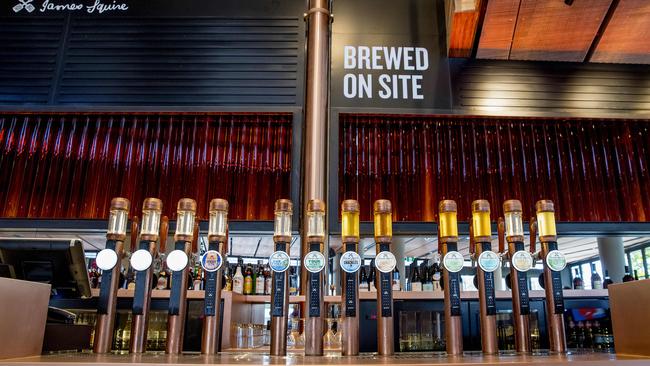Gold Coast business operators want to see Queensland border blockade torn down to bolster tourism industry
The city’s 60,000 small business powerhouse will struggle to hang on past the traditional summer peak if politicians fail to stop squabbling and put out the welcome sign, according to operators

Gold Coast
Don't miss out on the headlines from Gold Coast. Followed categories will be added to My News.
- Travel industry joining forces over borders
- No jab, no entry: Strict border policy on cards for Australia
THE engine room of the Gold Coast economy has one simple wish for Christmas: Open the damn borders.
The city’s 60,000 small business powerhouse says it will struggle to hang on past the traditional summer peak if politicians fail to stop squabbling and put out the welcome sign for all domestic tourists and international safe havens such as New Zealand.
Business leaders and owners who spoke to the Bulletin as part of the city-wide Future Gold Coast campaign realise they have been asking for the same thing for weeks, but say very little else can be done by them on the frontline until it happens.

The border closures have decimated the Gold Coast’s $6 billion tourism mecca and with it tens of thousands of reliant businesses.
Destination Gold Coast chairman Paul Donovan said he noted a slight softening of the Premier’s approach to the border issue, but it was not enough to help the industry through the Christmas season.
MORE NEWS
Queensland border: Gold Coast Mayor Tom Tate blasts premiers over border war of words
Gold Coast leaders call on Premier Annastacia Palaszczuk to tear down Queensland border blockade
Queensland COVID vaccine CSL could be ready by 2021, opening up international borders
“I don’t understand it, obviously easing of restrictions will help with clubs, funerals and weddings, but until we get the border opening to greater Sydney and Victoria we are not going to get the volume of tourists we need.
“We need the Premier to open the border sooner rather than later so we can get some of the market back.
“The worry is they will book at another destination over this vital period because of the lack of certainty.”
Aside from an influx of travellers, an injection of life at the Gold Coast Airport and cash into family pockets, flow-on effects for easing restrictions would include an end to some parts of the workforce declining work and relying on federal government subsidies such as JobKeeper.
“The locals have been fantastic, but at some point, that market does get exhausted,” said Steven De Maio, general manager for Broadbeach eateries Koi and Maggie Choo.
“Schemes are good, like JobKeeper and JobSeeker, but I think the most important thing is actually rebuilding the economy instead of giving a false sense of economy.

“Letting people know that Queensland is open for business and we are safe, we are clean, and that we are ready should be top of the list.”
Lucky Squire area manager Brett Gorman: “As soon as the government eases restrictions and can explain what the new normal will be the freer people will feel.
“I can see the Gold Coast and Broadbeach doing well out of restricted international travel. It will see more people travelling here.
“I think incentives to get people back to work is what’s going to be the key.
“At the moment some of the packages are keeping people away from work.”
Government figures in May showed more than 27,000 Glitter Strip businesses had applied for JobKeeper, supporting over 100,000 workers. The Federal Government contribution to those staff was $150 million a fortnight.
In July, the Gold Coast’s unemployment rate was 6.1 per cent, its highest in a decade. The work force participation rate also took a hit with just 65.5 per cent of locals engaged in some form of employment.
By August the city’s unemployment rate had hit 6.3 per cent — again masked by federal government subsidies — the highest in 15 years.

Mill Bakery owner Charmaine Battiss said worker schemes needed to be adjusted to entice experienced hospitality workers to stay in the industry, and guidelines modified to allow businesses to work in the new climate.
“It’s a natural assumption life has changed and that we’re all going to have to do things differently,” she said.
“Some guidelines need to be set for what our new way of living will look like — even for the next 18 months.
“Businesses need to keep thinking outside the box and prepare for changes, and guidance to help adaptation will benefit all parties.”
Dan Petrie, the chief information officer at financial data and analytics firm Grafa, said a next step for small businesses was to get them prepared for a new digital world.
“Businesses no longer run brick-and-mortar,” he said. “The more training that can be provided to a business and staff around digital skills the better, be that from federal or state government.”


